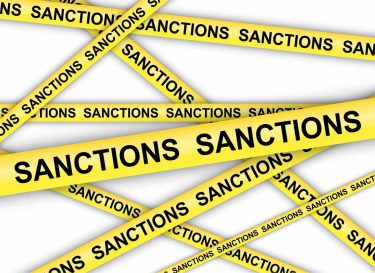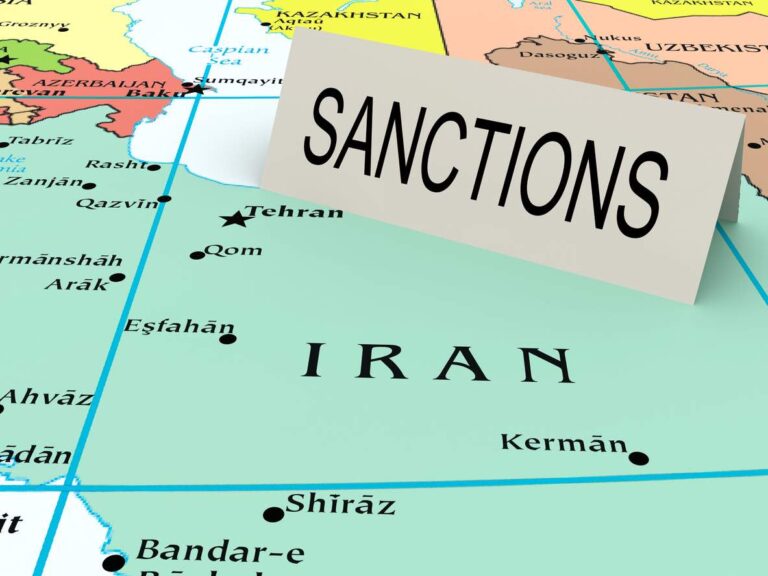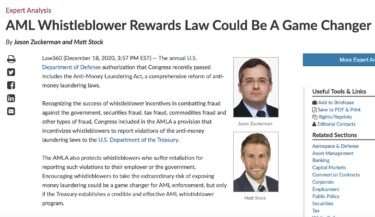DOJ’s Increased Focus on Intersection of Corporate Crime and National Security
On November 28, 2023, Principal Associate Deputy Attorney General Marshall Miller delivered remarks at the New York City Bar Association’s International White Collar Crime Symposium, concerning the DOJ’s efforts to “address the rapidly increasing intersection between corporate crime and the risks that threaten both U.S. and global security.” Those risks include:
- terrorist financing;
- sanctions evasion;
- export control circumvention; and
- cybercrime and crypto-enabled crime.
A growing share of the DOJ’s corporate investigations and resolutions implicate national security and the sophisticated schemes that the DOJ is targeting contribute to global instability and “interrupt supply chains, divert disruptive technologies to dark places, and fuel the misdeeds of rogue nation-states.” According to Miller, the DOJ is surging resources to address the challenge. For example, it increased by 40% the number of prosecutors in the Criminal Division’s Bank Integrity Unit, the unit that prosecutes financial institutions’ violations of U.S. sanctions and the Bank Secrecy Act.
The DOJ’s increased focus on the intersection of corporate crime and national security is bearing fruit, including the DOJ’s November 21, 2023 announcement of charges against Binance and its founder, Changpeng Zhao, resulting in $4.3 billion in penalties. Binance failed to register as a money transmitting business and failed to maintain an effective AML program. It allowed users to open accounts and trade without submitting any identifying information beyond an email address and lacked protocols to flag or report transactions for money laundering risks. According to a press release announcing this enforcement action, “illicit actors used Binance’s exchange in various ways, including conducting transactions for mixing services that obfuscated the source and ownership of cryptocurrency; transferring illicit proceeds from ransomware variants; and moving proceeds of darknet market transactions, exchange hacks, and various internet-related scams.” Binance also failed to implement controls that would prevent U.S. users from trading with users in Iran and willfully caused over $898 million in trades between U.S. users and users ordinarily resident in Iran.
Whistleblowers Will Play a Critical Role in Strengthening the Government’s Ability to Detect and Combat Money Laundering and Sanctions Violations

Managers at Construction Specialties Middle East L.L.C. (“CSME”), a wholly controlled UAE subsidiary of Construction Specialties Inc., a US company that sells specialized building materials, imported building materials from the US to the UAE and then knowingly reexported them to Iran. They falsified the ultimate destination of goods on seven purchase orders to the U.S. suppliers to avoid linkage to Iran, and took steps to ensure that the purchase of these U.S.-origin goods and their association with Iran would not be reflected in CSME records. As described in OFAC’s press release, a whistleblower’s disclosures halted the misconduct:
Despite CSME’s senior managers’ efforts to conceal these activities, a U.S. person employed at CSME in Dubai discovered the conduct at issue after overhearing the CSME senior managers reference U.S.-origin goods for a “big job.” When the U.S. person employee inquired, the managers told them they were “confused.” Unconvinced, and suspicious of the secretive behavior of the CSME senior managers, the CSME employee inspected related documentation and discovered elevated levels of sales, general, and administrative expenses in the region, which the U.S. person employee believed corroborated their suspicion. CSME’s GM immediately dismissed the employee after they confronted the GM about the unexplained elevation in regional expenses. The same day, the U.S. person employee flew to the United States and reported their discovery and suspicions to CS headquarters. CS initiated an internal review soon thereafter, terminated all Iran- related business activity, and voluntarily reported the matter to OFAC.
The whistleblower’s success in persuading CS to halt violations, however, is not the typical experience of corporate whistleblowers. All too often, companies ignore whistleblower disclosures or retaliate against whistleblowers. Indeed, speaking up about money laundering or sanctions evasion is a very risky proposition and can entail a whistleblower jeopardizing not only their livelihood, but also their personal safety. And that is why financial incentives for whistleblowers are a critical tool for AML and sanctions enforcement.
Whistleblower Rewards for Sanctions Evasion and Money Laundering

To qualify for a whistleblower award under the AMLA, the whistleblower must provide original information to their employer, the Treasury, or the DOJ. If the whistleblower seeks to submit information anonymously, the whistleblower must be represented by counsel.
Whistleblowers abroad who are not U.S. citizens are eligible for AMLA whistleblower awards where the BSA violations or sanctions evasion they report are within the jurisdiction of U.S. law enforcement.
In contrast to the SEC whistleblower program eligibility rules, the AMLA whistleblower reward program does not impose limitations on award eligibility for whistleblowers who gain information through the performance of compliance or audit job duties. Indeed, the AMLA whistleblower law expressly authorizes compliance personnel to obtain AMLA whistleblower awards in that the term “whistleblower” includes an individual who provides information relating to a violation “as part of the job duties of the individual.”
In determining the amount of an award, the Treasury will consider the following factors:
- the significance of the information provided by the whistleblower to the success of the covered money laundering judicial or administrative action;
- the degree of assistance provided by the whistleblower and any legal representative;
- the programmatic interest of Treasury in deterring the particular violations that the whistleblower disclosed; and
- additional relevant factors that Treasury will promulgate, which will likely echo the factors that the SEC employs to determine the amount of an SEC whistleblower award.
The AMLA whistleblower reward program is modeled on the highly successful SEC whistleblower program. Since its inception, the SEC whistleblower program has enabled the SEC to uncover significant investment fraud schemes and halt ongoing fraud. Since 2011, the SEC has paid more than $1.9 billion in awards to whistleblowers for providing information that led to successful enforcement actions. And whistleblower disclosures to the SEC have enabled the SEC to obtain more than $6 billion in monetary sanctions.
The AMLA also includes a robust whistleblower protection provision. A prevailing whistleblower can obtain the following remedies:
- Reinstatement with the same seniority status the employee would have had but for the retaliation (or front pay in lieu of reinstatement when reinstatement is not feasible).
- Twice the amount of back pay otherwise owed to the individual, with interest.
- Compensatory damages;
- Attorneys’ fees, litigation costs, and expert witness fees.
How Can an AML Whistleblower Lawyer Help a Whistleblower Maximize their Recovery?
The anti-money laundering whistleblower attorneys at Zuckerman Law have represented whistleblowers disclosing AML and sanctions violations. Our multi-disciplinary whistleblower rewards practice is staffed with an attorney who is also a Certified Public Accountant and Certified Fraud Examiner with substantial experience investigating complex financial frauds.
Our team of AML whistleblower lawyers can:
- Enable a whistleblower to report anonymously.
- Help a whistleblower qualify for an award under other whistleblower reward programs, such as the IRS whistleblower reward program or the SEC whistleblower reward program.
- Skillfully guide a whistleblower through the process, maximizing the likelihood that they will qualify for an award.
- Assist the whistleblower to combat workplace retaliation.
Contact us today to find out how we can help you report AML or sanctions violations while remaining anonymous.






Guide to Anti-Money Laundering Act Whistleblower Law
Guide to Anti-Money Laundering Act Whistleblower Rewards and ProtectionsAML Whistleblower Lawyers’ Expert Analysis About the AML Whistleblower Reward Program



